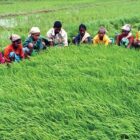Despite shortcomings, India can achieve higher GDP growth but only when farmers’ views are incorporated in the farm policy fine print, driving the country towards equitable growth.
The BJP-ruled state governments and its RSS-affiliated farmers’ wing, the Bharat Kisan Sangh, are worried about the fallout of the central government’s agricultural policies. People are confused, on the one hand, by the propagation of cow urine and, on the other, by the ongoing genetically-modified (GM) crop trials. Are they compatible, some ask; others find it difficult to align such ‘traditional knowledge’ with ‘controversial science’. Having suffered considerably low farm-gate prices, farmers who supported the BJP are now wavering. Even BJP leaders are struggling to explain, for instance, the land acquisition amendments as a pro-farmer initiative.
The opposition blames the ‘controlled’ voices of dissent from within the Sangh Parivar as a strategy to keep dissenters within the fold from leaving the flock. Others allege the raised pitch for Ayurveda, desi cow products and the swadeshi hard-sell to be a ruse to slip in contentious agendas, such as FDI in retail, a corporate-friendly seed Bill, trade pacts and GM technologies. Numerous things are required to ensure farmer prosperity. Some solutions can be antagonistic and arouse fierce debate. Many contentious issues can be set aside for the time being to facilitate a minimum acceptable agenda for a polarised society, especially when the government is short of a majority in the Rajya Sabha.
One could learn from the 18th-century Maharaja Surajmal of Bharatpur, who would wage war by dispatching raiding parties after the harvest season so as to have farmers free to bolster the forces. Timing is key. The UPA lost a lot of political capital supporting laws that it was deluded into enacting by armchair academics into enacting. The NDA must tread carefully because it is an uphill task to keep aspiring farmers satisfied. There are some path-breaking developments though; some specifically related to agriculture. The ideas on crop insurance, the DD Kisan channel on Doordarshan, skill development and soil-health cards are excellent and do underline a vision. What is missing is the team to design the implementation of policies.
The crop insurance proposals can be termed a success if after three years a natural calamity strikes, farmers are automatically paid by crop insurers. The existing patronage culture will inhibit DD Kisan from igniting the farmer’s imagination. As for skill training diplomas, the numbers will not matter but the quality of training will. The government will manage to issue millions of soil-health cards. Even presuming these are technically accurate and cover micronutrients, one doubts the farmer’s understanding of the implication. Soil-testing is a means to an end, not the end.
India must emulate China, which accounts for 30 per cent of the global fertiliser consumption. China estimates that since 2005, when it started a programme to test soils and give site specific fertiliser recommendations to farmers, fertiliser use has dropped by eight million tonnes. Our irrigated lands have become salt pans without drainage facilities, while the rest of the country is being parched of water. Successive governments have lacked the political will to act prudently. Along with soil, PM Narendra Modi must make water a priority though new irrigation projects are not the answer. India can reduce our water, fertiliser and pesticide consumption per unit and still achieve higher yields. After decades of neglect of farm advisory services, only a handful — farmers included — recognise the potential to raise yields per animal and per acre sustainably as an integral part of the solution to combat rural distress.
Improved yields will result in increased production, farmer incomes and rural wages. It is equally imperative to build farmer resilience to bear weather and price shocks. All these require 10 years of sustained effort. The five-year cyclic politicians do not have the patience. It is never too late, however, to start a good programme though it is getting late to start programmes that will provide meaningful results to convert into electoral gains. Unfeasible policy fine print contrived by economists and directed by industry will make inclusive growth an improbability. Economists are artists who can crunch numbers and conjure success out of sheer failures.Governments have a tendency to dish out such numbers for proving success. Quoting numbers is easy, measuring success is difficult, feeling the transformation more so.
A year before the next parliamentary elections three years from now, realising the absence of a successful transformation, the regime can be compelled to flood the nation with meaningless populist schemes to garner votes. Despite all shortcomings, it is possible for India will achieve higher GDP growth but that will happen only when farmers’ views are incorporated in the fine print of the farm policy, driving the country towards equitable growth.




